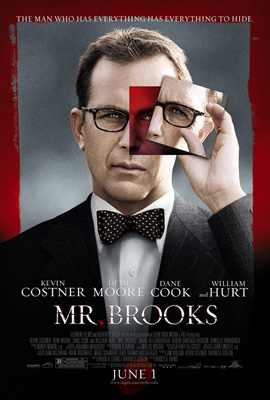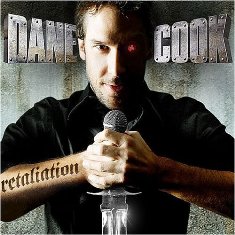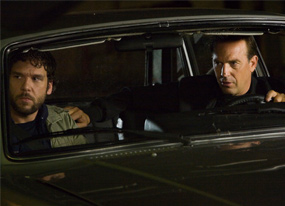 I trust Dane Cook needs no introduction. The white hot stand-up comedian has, in the last two years, released a platinum-selling CD (Retaliation), received his own HBO behind-the-scenes series (Tourgasm) and sold out arena shows all over the country like a latter day Andrew Dice Clay. He is ubiquitous and seemingly unstoppable.
I trust Dane Cook needs no introduction. The white hot stand-up comedian has, in the last two years, released a platinum-selling CD (Retaliation), received his own HBO behind-the-scenes series (Tourgasm) and sold out arena shows all over the country like a latter day Andrew Dice Clay. He is ubiquitous and seemingly unstoppable.
He’s also controversial for reasons we’ll not get into right now because, over the course of this ten minute roundtable/press conference, I didn’t have the opportunity to work in a question regarding his joke writing habits. Of course, even if we did have more time, I’m not sure I would’ve broached the subject; he’s awfully disarming in person. Does this make me a bad journalist? Certainly. But there’s a time and a place, and this felt like neither since Cook is actually rather good in Mr. Brooks as a scumbag who tries to blackmail the titular serial killer (played with exacting creepiness by Kevin Costner). Unlike Cook’s last few movies (Employee of the Month, London and Waiting), he’s working with a director, Bruce A. Evans, who’s interested in wringing interesting stuff from the actor. And what drips out is distressingly caustic. It could be that Cook’s future as an actor will have nothing to do with comedy.
I’ve interviewed Cook twice before, and I’ve always found him to be very serious about his work. Either by choice or… something else, he’s definitely not funny off the clock. So, if you’re a fan, don’t read this transcript expecting to pee your pants with laughter – i.e. unless respectful anecdotes about sharing scenes with William Hurt work you over like a classic Marx Brothers routine.
Q: We heard you videotaped your audition to get this role.
Dane Cook: Yes. It was like auditioning for American Idol or something like that. (Laughs) When somebody asks you "Will you go on tape?", it’s kind of the kiss of death. You really want to be able to meet the producers and talk about your take on the character, but when you do a tape you never know if the person has a baby in their arms or what’s going on in there life. Rarely does that seem to work in your favor. But I did it. I was down in New Mexico filming Employee of the Month, and I literally ran between scenes – because I had this one day to do it – set up the camera, and I had one of my good friends read the lines. He was awful, too. He’s not an actor at all. I kept stopping to tell him how to act. I’d be like, "Say this. Be like (menacingly), ‘I’m going to kill you!!!‘". And he’d say (awkward), "I am… going to… kill you." Acting is reacting, and I’m like, "God, you suck!" So there were a few takes where I had to stop it, but I finally got the take I wanted because, truly, I had a real epiphany when reading the script. I was pacing, reading the lines out loud – you always hear about how if it’s the right part, it starts to take a hold of you – and I knew this guy; I’m an optimistic, encouraging, glass-is-half-full kind of person, and yet I understood this deviant, lascivious side of this person. I kind of drew from a few people that I’d met in my travels. So I spun the wheel, sent the tape and got the call. "You did it. You did it, kid. You’re in the flick. You’re heading to Shreveport."
 Q: How is it to go from writing your own material to doing a more rigidly scripted film where you can’t improv?
Q: How is it to go from writing your own material to doing a more rigidly scripted film where you can’t improv?
Cook: Ninety-five percent of the time, I’d say you’re right; it’s the writer and the director’s vision, and you’re a piece of their puzzle. It’s the polar opposite of comedy, where you’re in such control; you’re the writer-director-producer-sometimes bouncer. The other five percent, though, was scenes with Kevin… there’s a scene where, after we’ve just come back from one of our dirty deeds, we just started improvising in the car. And Kevin was so open and available to that. He really encouraged it. I remember I was punching the seat, and just trying to get myself in a [bad] place. Honestly, you could do that and feel embarrassed in front of certain actors…, but Kevin was like, "Do that, man!" I said this one line about, "Oh, did you see her face!?!?" When we did it again, he was like, "You’ve got to say that again." So we really started improvising. I was like, "I’m in this dramatic scene, and we’re improvising about having just murdered this couple." So it was being able to take the best of what I know how to do comedically, and the best of working with someone iconic like Kevin Costner who you just trust… and the material, which was solid. It was like, "We can’t miss. This just feels right." I know that this is going to be the type of thing, especially this scene, where people will be able to watch [Mr. Brooks] and feel moved by it.
Q: William Hurt says about your character, "If he were charming and funny, I still wouldn’t like him." Was that improvised off your own personality?
Cook: William’s line was always in there. It’s interesting, because I brought a few of my closest friends to see an early screening of the movie, and one of my best friends, who knows me and knows my comedy, turned to me right around that part and said, "I fucking hate you!" It was the best compliment I’ve ever received. I was like, "Then I did something right." And that line just happened to be in the script.
Q: Before reading this script, did you ever imagine you’d do something this dark?
Cook: I did do a short film about five years earlier called "Spiral", which I’d say is on par [with Mr. Brooks] as far as darkness. It’s something I’d written and produced, and… it served two purposes. On a selfish or promotional level, it was like, "Let me show people what I can do. Let me show people that it’s more than just stand-up comedy. And the only way I’m going to have that is if I do it myself." But then there’s that creative side, if you’re using the left side of your brain, like… I’ve done stand-up for seventeen years. I need to explore other things whether it be doing a voiceover for this other movie I’m doing, or talking about doing this theater project coming up. I just want to be able to challenge myself. Comedy is safe for me. I can perform in front of 20,000 people at Boston Garden and I’m like, "I know how to do this." But I want to be a little scared.
Q: It’s like Michael Jordan with golf.
Cook: Yeah. Or… well, I shouldn’t compare to baseball because, god, he sucked. (Laughter)
Q: Can you talk about what it’s like to go from struggling stand-up comic to comedy superstar?
Cook: When I was in Boston, all of my comedian friends were going to New York. And I said, "I’m not going to New York." And they said, "You’ve gotta go. Now’s your opportunity!" And I said, "I’m not going to go to New York until New York calls me, until I have a purpose to go there." That’s how I do everything. I don’t say, "I need to do a comedy or a script or whatever." I had other comedic scripts come along before Employee of the Month. I had other TV shows and other things that I didn’t feel were authentic, that didn’t "pump my nads". Do you know what movie that’s from? Anybody? Breakfast Club? Okay.
I don’t push. I guess that’s kind of my thing: don’t push. I always have stand-up, I always have ways to make a few shekels, I’m not in need, so I just wait for stuff that makes me go, "Shit, that’s kind of creepy! That’s weird! That’s scary!" I think on a personal level…, who knew, with stand-up comedy, that I would be able to do that? I hoped to god that it would be a vehicle that would lead me to everything, that maybe with comedy I could bash down the doors and do all kinds of stuff. But that’s up to the movie gods and up to the audiences to go, "Yeah, we’d like to see you do that." And when I started getting the nod from my fans, and some scripts that were actually appealing came in, I was like, "I’m not going to push. I’m going to go with the flow. And if this is what I’m meant to do now, I’m going to do it for the rest of my life." And if not, I’ll create something somewhere… behind the scenes? I don’t know. Wherever I’m meant to be, I’m going to just eat it up. I enjoy the hell out of it. I’m not going to lie to you. I love my job. I love the art of comedy. But I love doing these movies, and I really hope that I get to do a lot more.
Q: Can you talk about the experience of being in a scene with William Hurt, but having to shut him out entirely? (Hurt’s character, Marshall, is a product of Mr. Brooks’s tortured imagination.) I mean, he’s an Oscar-winning actor.
Cook: You can’t ignore William Hurt. It’s William Fuckin’ Hurt. I’m pretty careful, and I’ve done this around other comedians. I like to keep it light on the set, and I like to have a good time. I’m not a method person even though I like to do research. It’s like Eddie Murphy once said about Beverly Hills Cop: "It all has to be in the script first; then I can improvise and go from the spine here."
But I didn’t know how to approach William Hurt. I didn’t want to get in his head, because I didn’t know what his take was. So I just waited. And I remember we did this first scene in the boardroom together where he’s sitting on the end of the table. I’m feeling him. But I can’t, you know? I’m trying to get myself into that zone. So I finally figured it out. And once I got into this rhythm, I lost William Hurt. I remember what Al Pacino said to Chris O’Donnell about Scent of a Woman: "I never saw you, but I felt like you were great." Or something. But I started doing this thing where I didn’t feel William Hurt. Then he walked up to me on the second day of shooting and put his hand on my shoulder, and I was like, "Ah!" It was kind of weird, because I was so used to not having him in my life. And I just remember he said something really encouraging. He said something like, "You know, I shouldn’t say this right now because we’re doing this, but… you’re doing really great." And I just went home and called my whole family and said, "William Hurt just said I’m doing great. And he really meant it."
There’s that scene in the car where he leans in between Kevin and I. I didn’t expect him to do that; I just kind of had to do my thing. But you could feel him. He’s got The Force. He could flick me out of a scene if he wanted to. He could just (flicks his finger), and omit you from a scene. (Laughter) Kevin’s got that. And even Demi. I mean, these are the elite! I’m a competent guy, and I knew why they were bringing me in, and I knew I could hang. But I also knew that I was going to experience things with them, because I was new to that level; that I was going to have to shut the fuck up and really listen and learn. I did that every day, and it was the best course in acting you could ever have.
 Q: One of your funniest scenes is when you’re cruising with Mr. Brooks looking for someone to kill. Is there a certain group of people that you’d like to single out for elimination? Maybe hecklers?
Q: One of your funniest scenes is when you’re cruising with Mr. Brooks looking for someone to kill. Is there a certain group of people that you’d like to single out for elimination? Maybe hecklers?
Cook: I love hecklers. Hecklers remind you that you’re a comedian. Even though, yes, they throw off the whole tempo and rhythm and sometimes cut right into the middle of a bit that was just right there… there’s always been that thing in the back of my brain: "This guy’s yelling at me because I’m a fucking stand-up comic. This is what I do, and it’s the coolest thing ever." So, no, I wouldn’t go after hecklers. I’d go after some club owners who treated me like a douchebag. (Laughter) I’d definitely take on some of those guys if I could be Mr. Smith for a day.
Q: Do you have standby line for hecklers?
Cook: Yeah. "Shut the fuck up!"
Q: Well, I know lots of comedians have them. I’ve twice heard George Carlin say, "Will someone reach over and stab that fucker???"
Cook: It just depends on the day. It depends on the heckle and it depends on the room. I like to take it on a case-by-case study. (Laughs)
Q: What are you working on now?
Cook: I’m getting ready to do another film with Lionsgate, kind of a dark comedy called Bachelor #2. We’re going to start filming that in July. We’re casting it right now, and it’s appealing because it’s… I always put it in the vein of Bad Santa. It’s a comedy, but I’m playing a real prick who seems to have no emotional attachment to anything. It’s just a different side of my comedy, whereas Good Luck Chuck has a lot more physicality and… charisma, I guess? This is a guy named Tank. He’s going to roll over everybody. There’s no filter. It’s almost like how you would treat a heckler on any given night. Anybody who he experiences in his life, he’s just going to go for their weak point. If you have a cleft lip, he’s going to be like, "You’ve got some shit on you." You’re in trouble with this guy, so I’m looking forward to getting into it.
Q: Are you going back to stand-up?
Cook: Always. I’d do stand-up tonight if I could. Stand-up is my baby.